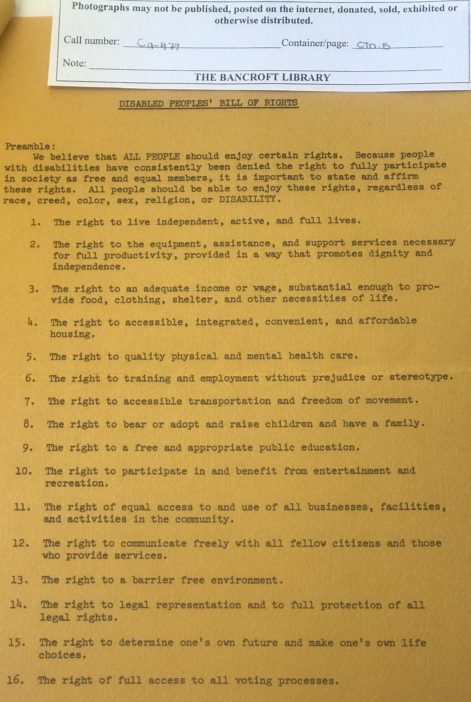It is unknown if the DSP or a group of students came up with this Bill of Rights, but it is impressive because it states 16 issues that have commonly and historically been an impediment to the disabled community.
Among these rights are “the right to the equipment, assistance, and support services necessary for full productivity”, “the right to live independent lives”, “the right to quality physical and mental healthcare” and “the right to accessible transportation.”
Since the 1970s both the administration at Cal and the DSP have tried to provide the needed accommodations, but they have been restricted by funding and the increasing number of students that require such services. For instance, the DEP. Of Rehabilitation stopped funding for much-needed auxiliary services in 1981 and although the DEP agreed to fund the DSP again, from that year on the DSP was always at risk of being defunded in one manner or another. Many students are unhappy that the DSP chose to discontinue programs such as the WAIV program due to a lack of allocated funding. Some students thought of this program as one of the few successful programs of the DSP. The WAIV program provided necessary skills and knowledge to students so that they could lead more independent lives.
The administration and the DSP both aim to provide students with quality healthcare, but since the population of students with disabilities has increased drastically, the healthcare providers are unable to keep up with the growing demands on their time. This has left many students distraught and disappointed due to the fact that they may have to wait weeks or months in order to be seen by medical personal. Ultimately, this has led to some tension and between the disabled community at Cal and the service providers.
The DSP does try to provide accessible transportation in the form of the carts that are seen driving around campus. Since the 1980s, a few of these golf carts have been on hold for use by the DSP. In the past, the DSP did try to implement a method of transportation for disabled students where they would have access to certain locations in the city, but this service never came to fruition because the city of Berkeley and Oakland could not be made accessible in the way DSP wanted. This program was soon abandoned.
